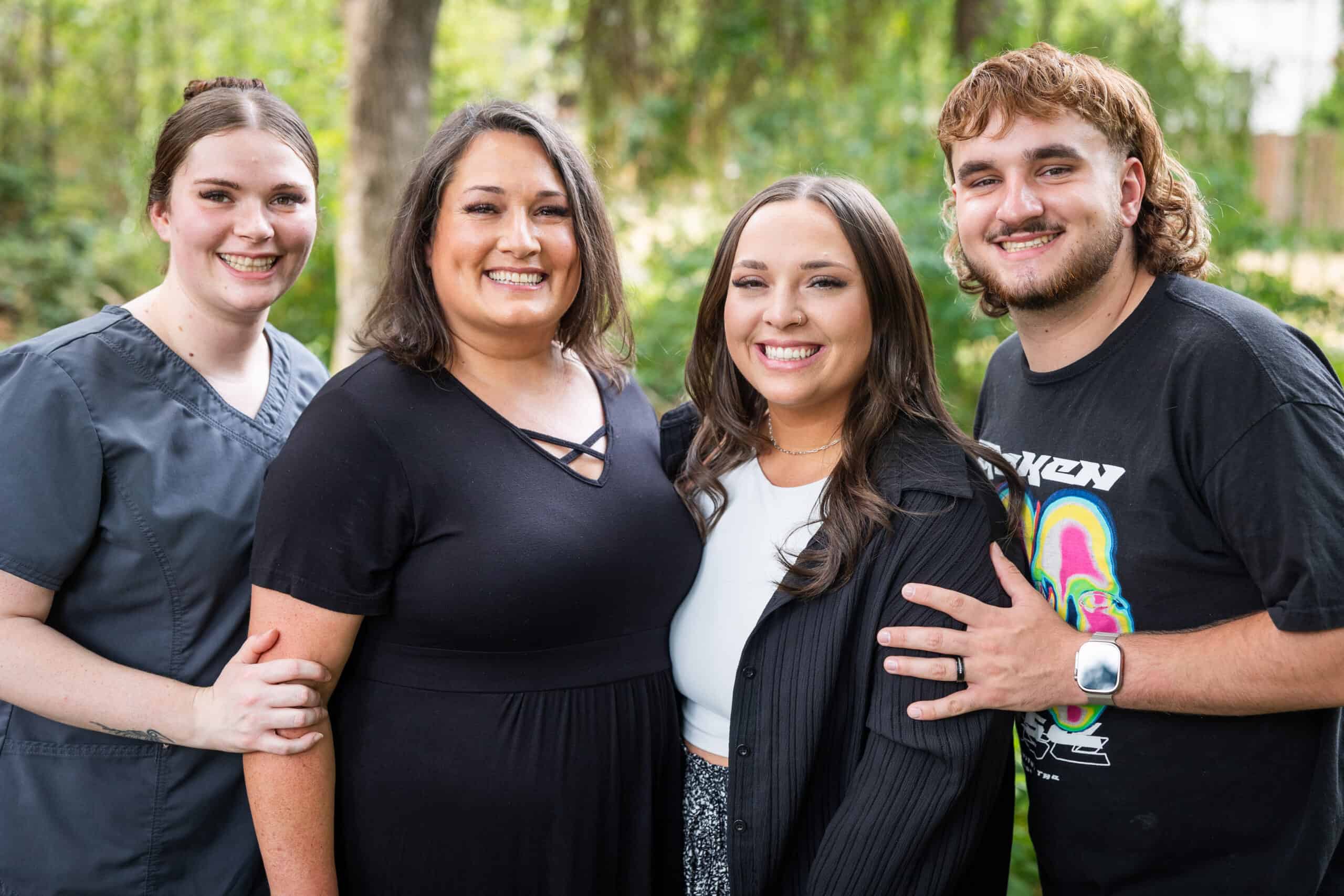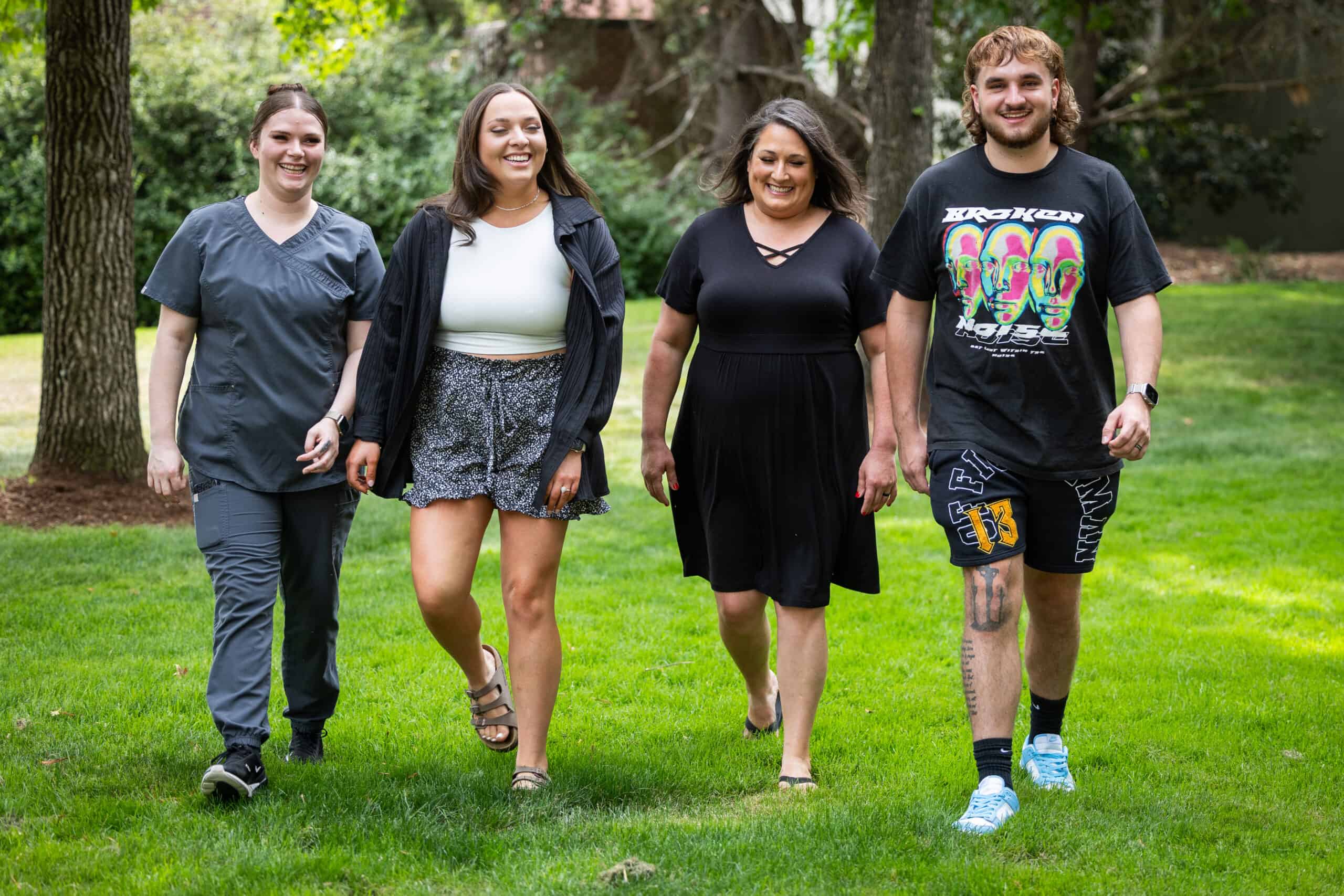Alice lay in a hospital bed, the machines blinking and beeping softly around her. She knew she was going to die. Just one month prior she had plans to cross state lines with a large amount of methamphetamines to meet some “associates,” a plan she knew was likely to land her back in prison.
But then the stroke happened. Instead of continuing in her criminal activity, Alice had spent her time trying to recover her faculties.
While in the hospital, Alice received visits from her daughters, who begged her to stop using drugs. They wanted their mother back—but Alice wasn’t ready to stop using. Not until she had the heart attack just a few short weeks later. She knew if she ever used drugs again—even just once—it would kill her.
“God took the ability for me to use drugs again with that heart attack,” she says.
A SPLIT HOME
As a child, Alice anticipated a different life for herself. Her parents’ home was filled with music. Her dad played many instruments and taught her three brothers to play as well. Her brothers would often sing to her. Growing up, she wanted to be a country music singer.
But the home was troubled and unstable, too. Her parents' marriage didn't last. At one point, Alice was placed in protective custody for a brief period before going to her grandparents’ home. Her grandparents’ home became her safe place during these difficult years. By the time Alice graduated from an alternative school, she went all the way to Guam, where her eldest brother worked, on a one-way ticket.
While in Guam, Alice developed an unhealthy relationship with alcohol and drugs. The legal drinking age in Guam is 18, so she was able to find work bartending. While working on a dive boat, a co-worker taught her how to skim money off the sales she was making. Her lifestyle quickly developed into drinking, partying, and traveling the Micronesian Islands—but it all came crashing down on her when she got pregnant.
Alice didn’t want to give up her lifestyle and knew that a pregnancy would derail life as she knew it. An abortion seemed like an easy answer—but afterward, the spiritual consequences weighed on her.
“I dove into a deep depression,” she says, “and wound up coming back home to my grandparents, which was once again, a solid rock I could stand on.”
KEEPING UP WITH THE JONESES
Now back in the States, and under the influence of her grandparents, Alice returned to school for her undergraduate education. While there, she met and fell in love with a man. They both attended church, and both liked to party.
They married, and had three children together, which led to a period of sobriety for Alice. It also led to an increase in her church life—a developing faith that would become a foundation for Alice in the years to come. Yet despite Alice’s blooming faith, the marriage was an unhappy one.
Alice and her husband worked for a lumber mill. They wanted to live life like everyone else—but really the pair was just keeping up appearances.
They lived outside of their means, acquiring things to appear successful. Underneath the surface Alice was angry.
“I planned this affair … not realizing how it was going to affect everyone: my children, the man’s wife, and his children, and my ex-husband,” she says.
The effect was not what she anticipated—instead of feeling a release of her anger, she was filled with guilt.
“The enemy was at work, and he was winning,” she says.
Her husband then filed for divorce. To Alice, the divorce felt like a death.
Her years of sobriety ended, and along with the alcohol and drug use, she returned to her criminal behavior.

“[Angel Tree] made me feel like even though I was in prison, I was part of something. I remember just really being grateful for that.”
—Alice
A MOTHER’S HEART
Her criminal activity resulted in 97 felony charges and a prison sentence for five years at Coffee Creek Correctional Facility.
But Alice’s heart for her children remained steadfast. During her incarceration, her children were placed in the custody of their father. He made sure they stayed in contact through phone calls and visits during the holidays—but it meant that she only got to see her children four times out of the year.
While at Coffee Creek, Alice came across Prison Fellowship Angel Tree®, which allows incarcerated parents to send their children a gift and personal note at Christmastime. She immediately signed up, excited at the prospect of providing a present for her children.
“It made me feel like even though I was in prison, I was part of something.” She says, “I remember just really being grateful for that.”
Alice signed up for Angel Tree every year she was incarcerated. Her children always looked forward to the gifts, excited to receive something from their mother. But for Alice, the best part was the connection Angel Tree created between her and her children.
A NEW WAY OF LIVING
But prison had little impact in changing her behavior, and upon release she quickly returned to drugs—both using and selling. Until the stroke happened.
“God stepped in. I believe that without a shadow of a doubt, He stepped in, and I had the stroke,” she says.
Then came the heart attack. This time, Alice decided she wanted something different for her life. She made the decision to move closer to her children, who lived in Portland, not knowing what that would look like. She heard through a friend about 211info, a nonprofit that connects community members to local resources—including women’s shelters and addiction recovery.

Her path was set. Alice packed her bags and boarded a bus to Portland, intending to spend New Year’s Day with her children and then call the shelter for a bed. At the advice of her children, she called as soon as she landed. The woman on the other end of the line informed her that there were no beds available. Her children fretted—but Alice remained unmoved.
“I promise you,” she said to her children, “I know in my heart that God has got a plan for me, and I’m here and He’s going to open the door.”
As soon as New Year’s was over, she called again. A bed had opened up.
A DOOR—AND A BED—TO HOPE
Alice moved into a women’s shelter in Portland and started attending church again. She participated in every class the church offered, eager to be involved. Then she was introduced to Estate Hotel, which offers an employment recovery program—a program that provides addiction treatment along with housing assistance and job placement.
For two years, Alice lived at Estate Hotel and worked at an auto parts store. When her time at Estate Hotel ran out, her old cell mate from prison suggested she look into Bridge to Change, an organization that provides assistance during reentry for those recently released from prison. She was hired to move into the reentry home and help the women adjust back to life.
Alice’s family life was improving in this time as well. Her relationships with her children were restored, and she met a man who would become her husband.
When Alice notified Bridge to Change that she was leaving to move in with her husband, they offered her a position as a special programs mentor and even put her through school to get the necessary certifications.
“I know I’m doing what He wants me to do and it’s a very fulfilling job,” she says.
During this time, Alice also got involved with Celebrate Recovery. She now tours the country, sharing her testimony and how God moved in her life.
Alice remembers how difficult it was when she got out of prison and carries in her a passion to help those returning from prison have a successful reentry. Not only that, she also longs to see people encounter the same radical grace she did through her relationship with Christ.
Some days Alice still struggles with anxiety—but she is learning how to hand that over to God, knowing that His promises follow you even through the pain.
Alice longs to help people encounter the same radical grace she did through her relationship with Christ.